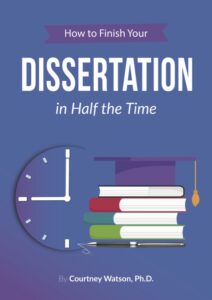I recently asked a professor what he considered to be the most important things for students to keep in mind while writing their dissertations. What will help students set themselves up for dissertation success? This is a summary of what he said:
Write a little every day.
As a writer, I know this to be one of the most important rules of success. No matter how talented I am or groundbreaking my material, none of it matters unless I can get words on the page. Theresa MacPhail, a seasoned dissertation-writing workshop coach at New York University, said,
I can promise you there is only one fail-safe method, one secret, one guaranteed trick that you need in order to finish your dissertation: Write. That’s it. Seriously. I hate to be the bearer of bad news, but there are no magical shortcuts to the production of prose, academic or otherwise. If you want to complete your dissertation in a reasonable amount of time—and trust me, you do—you must learn to prioritize the act of writing itself and write every day. Writing must become a non-negotiable part of your daily routine.
Choose an amount of time or number of words you know you can easily achieve every day, and commit to meeting that goal. Not that you have to stop there, but a daily commitment will give you a necessary foundation to build upon.
Read recent dissertations approved by your committee.
Reading some recent dissertations that were approved by the same committee you’re working with won’t take very long, but it could save you a lot of time in the long-run. It will give you an idea of what your committee is looking for, and if you’re unfamiliar with dissertation writing, it will provide an example of what you are charged with creating. It can also give insight into the nature of specific sections that may be confusing–the Conceptual Framework, for example–by giving a concrete example of something that may seem abstract in the rubric or directions.
Remember: it’s a marathon, not a sprint.
Go ahead, ask any long-distance runner, and they will tell you: if you run too hard in the beginning, you’ll drop out before the end. Top athletes learn to pace themselves, and it is for good reason that this practice has become a common idiom to remind people of all walks of life to slow down in pursuit of their goals and “take it one step at a time.” The truth is, overwhelm is almost inevitable at some point during the dissertation writing process, but it is not a state you should be living in all or most of the time. Remember, you will accomplish more if you move forward at a steady pace with a clear head than if you bang your head against the keyboard in fifteen-hour sittings or all night, every night, before work.
Reach out to other people.
Do you know that saying, “it takes a village to raise a child?” The same might be true for a dissertation. No dissertation is truly created by one person. The support of others is vital to achieving your goal. And those on your committee are not the only ones who can offer invaluable guidance and support. Other students–from your institution or others–can be valued companions who will help you through the challenges and celebrate your successes. Even a friend outside the world of graduate school can provide valuable input, encouragement, and advice. And if you ask for what you need, chances are your family will help you find a way to make it happen. Remember to show your appreciation to those who support you. While it’s easy to get caught up in the stress and responsibility of writing your dissertation, remember that others are giving their time and energy to support you, and they’re not getting a degree out of it.
Don’t wait until it’s perfect.
Yes, it is definitely important to submit work you feel reflects a high quality of scholarship and writing. It should be your “best” work. But the truth is, you will never have a “perfect” dissertation, just as no painter ever paints a “perfect” painting. There will always be things to tweak and change, but it’s important to remember that the purpose of writing a dissertation is to communicate with others about emerging research. If nobody gets to see it, it doesn’t matter how well it’s written.
I hope you’ve found these tips useful. If you have any questions or would like to talk about my editing services, feel free to contact me!






